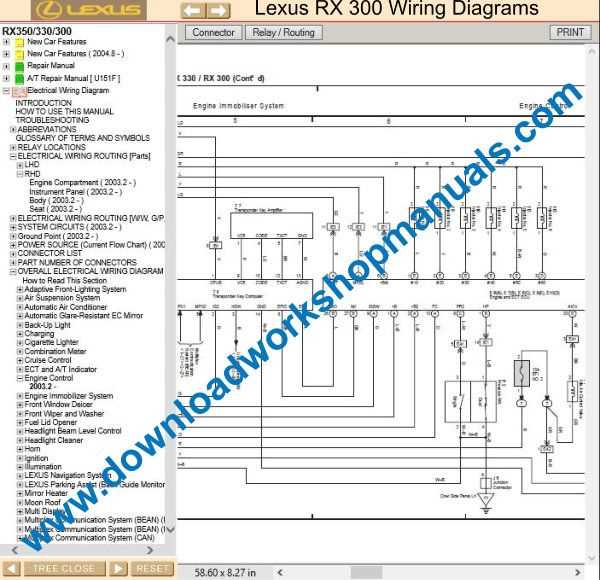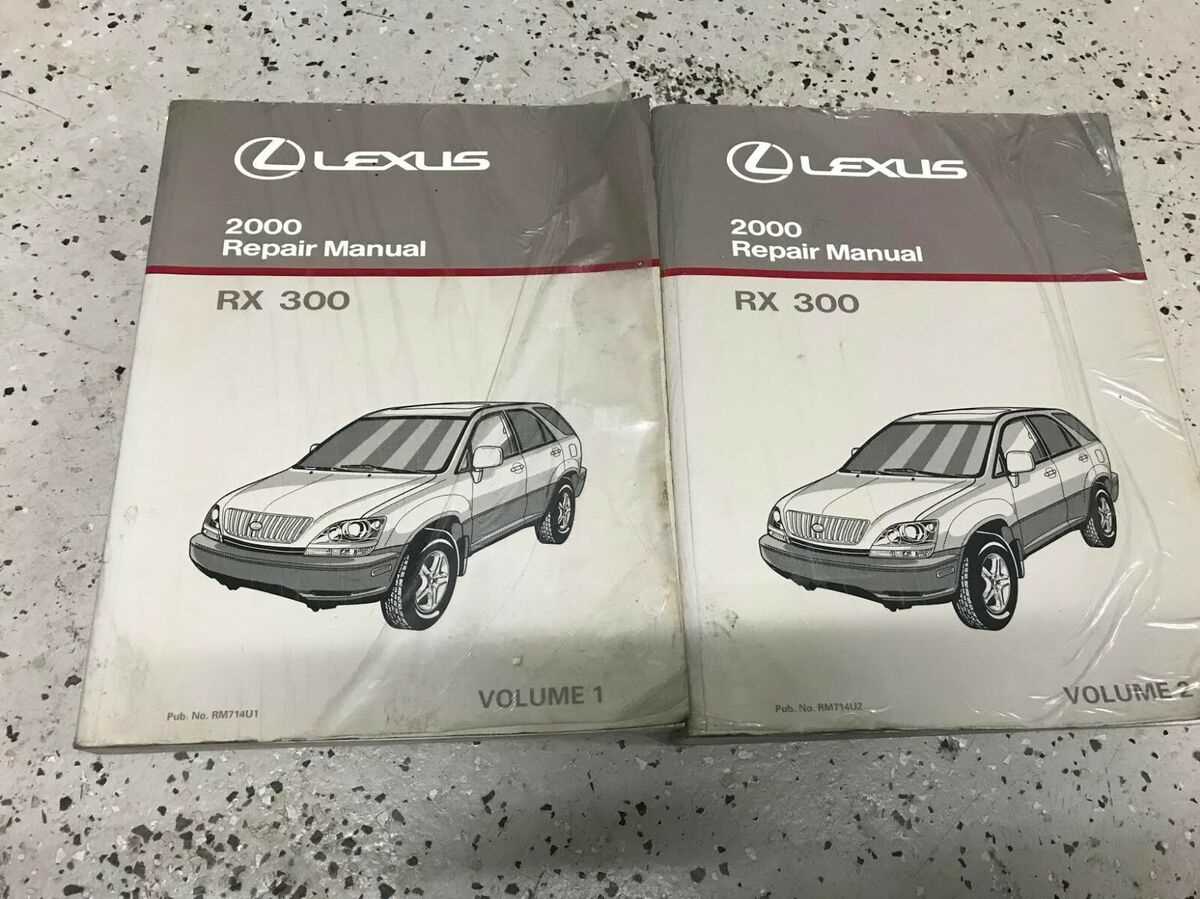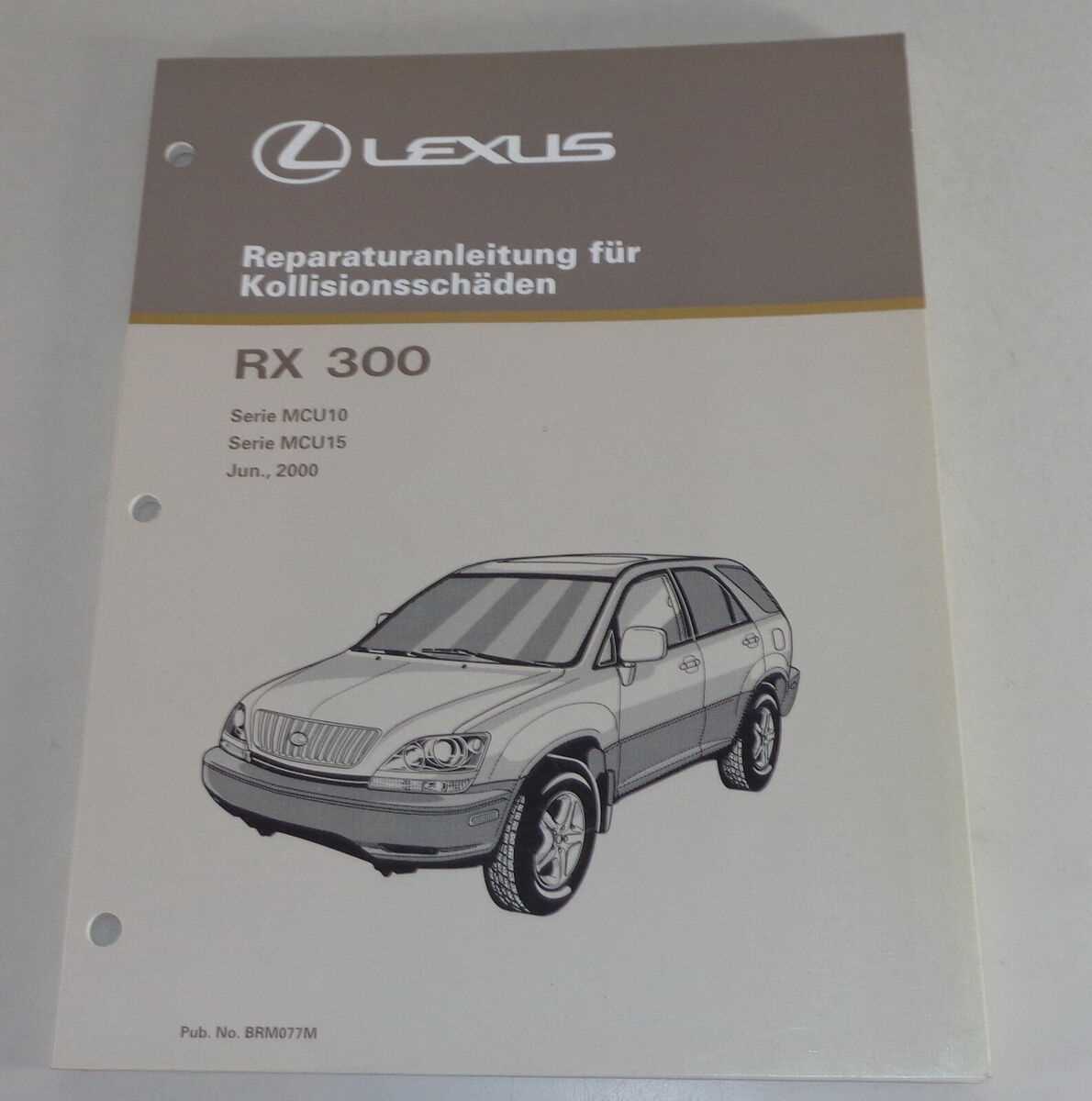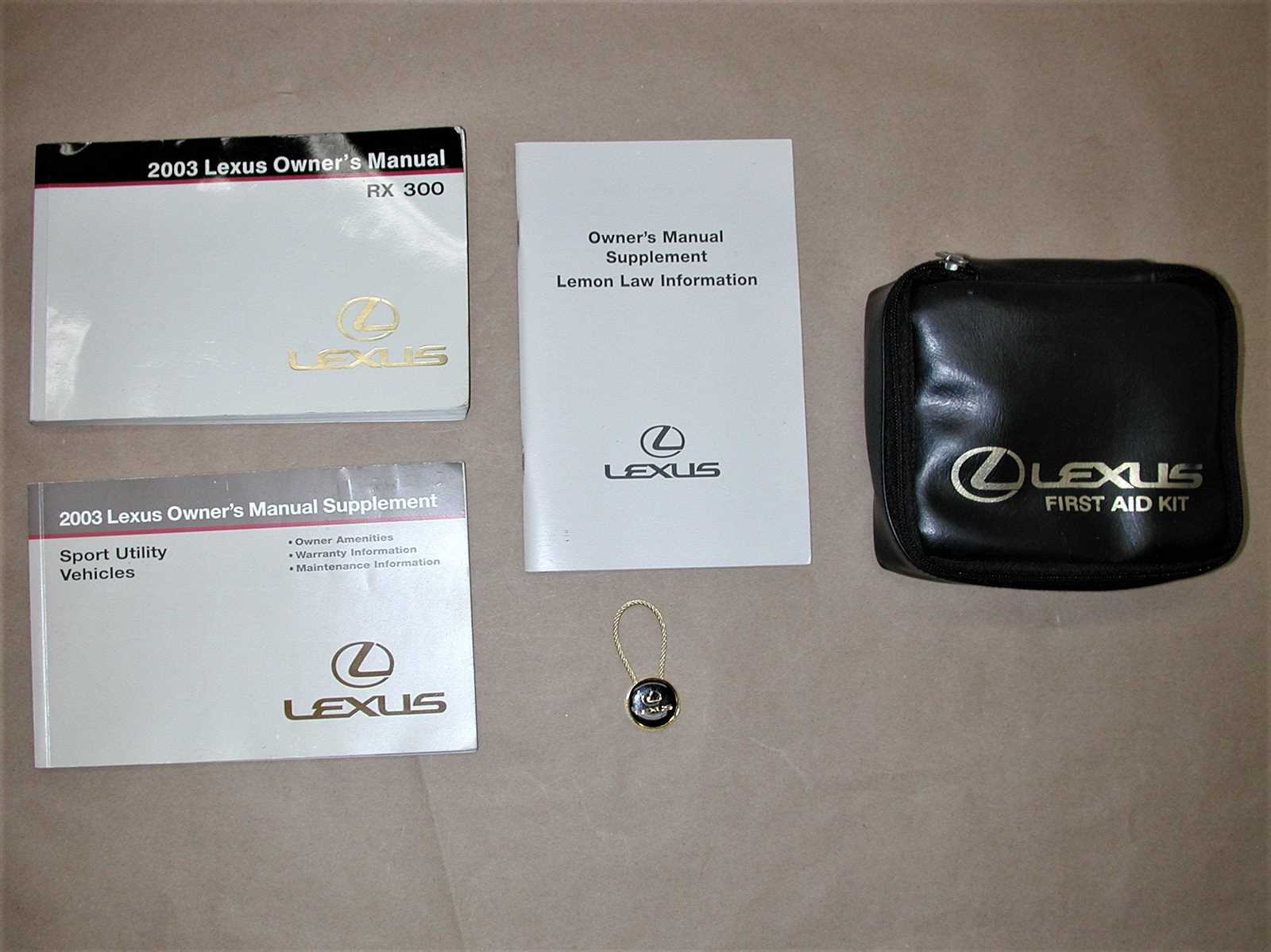2001 Lexus RX300 Repair Guide

Maintaining a vehicle’s performance and extending its lifespan depends greatly on regular upkeep and detailed attention to each system. In this guide, you’ll find a collection of insights and tips aimed at enhancing the longevity and functionality of your car through practical maintenance steps and essential service checks. By following these carefully outlined practices, your vehicle can remain in optimal condition.
Each section covers key aspects of care, from engine tuning to brake adjustments, ensuring you have the tools and knowledge needed for effective servicing. Additionally, practical guidance on routine tasks such as fluid changes, system diagnostics, and parts inspections will help maintain peak performance, prevent unexpected issues, and improve overall safety.
Detailed service procedures and essential maintenance tips are provided to assist with both minor fixes and more in-depth tasks. This resource serves as an invaluable asset, enabling you to better understand your vehicle’s needs and make well-informed decisions about its care.
Common Issues with This Mid-Size SUV Model
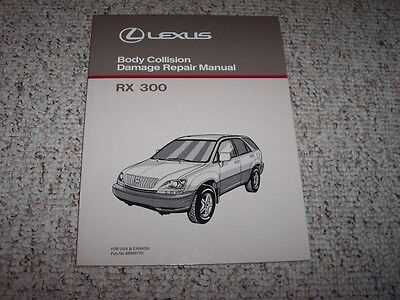
Many drivers of this vehicle model have encountered certain mechanical and electrical challenges over time. These common issues often arise from both normal wear and tear and design specifics that may require regular attention to maintain optimal performance.
Transmission Concerns
A frequently reported problem is related to the transmission system. Symptoms can include slipping gears, delayed shifting, and unusual noises during gear changes. Addressing transmission issues early is essential to avoid further complications and costly repairs.
Engine Oil Leaks

This model is also known for occasional oil leaks around the engine area. These leaks often occur at the valve cover gaskets or oil pan. Regularly checking for oil spots under the vehicle can help identify this issue early, allowing for timely repairs to prevent further damage.
Understanding these common problems can aid owners in maintaining their vehicle’s reliability and longevity, as prompt solutions ensure smoother operation and reduce the risk of breakdowns.
Essential Tools for Lexus RX300 Repairs
Working on a vehicle of this type requires the right tools for efficient maintenance and effective adjustments. Properly equipped with these instruments, even complex issues can be managed more easily, and routine upkeep can be performed with precision.
Basic Equipment
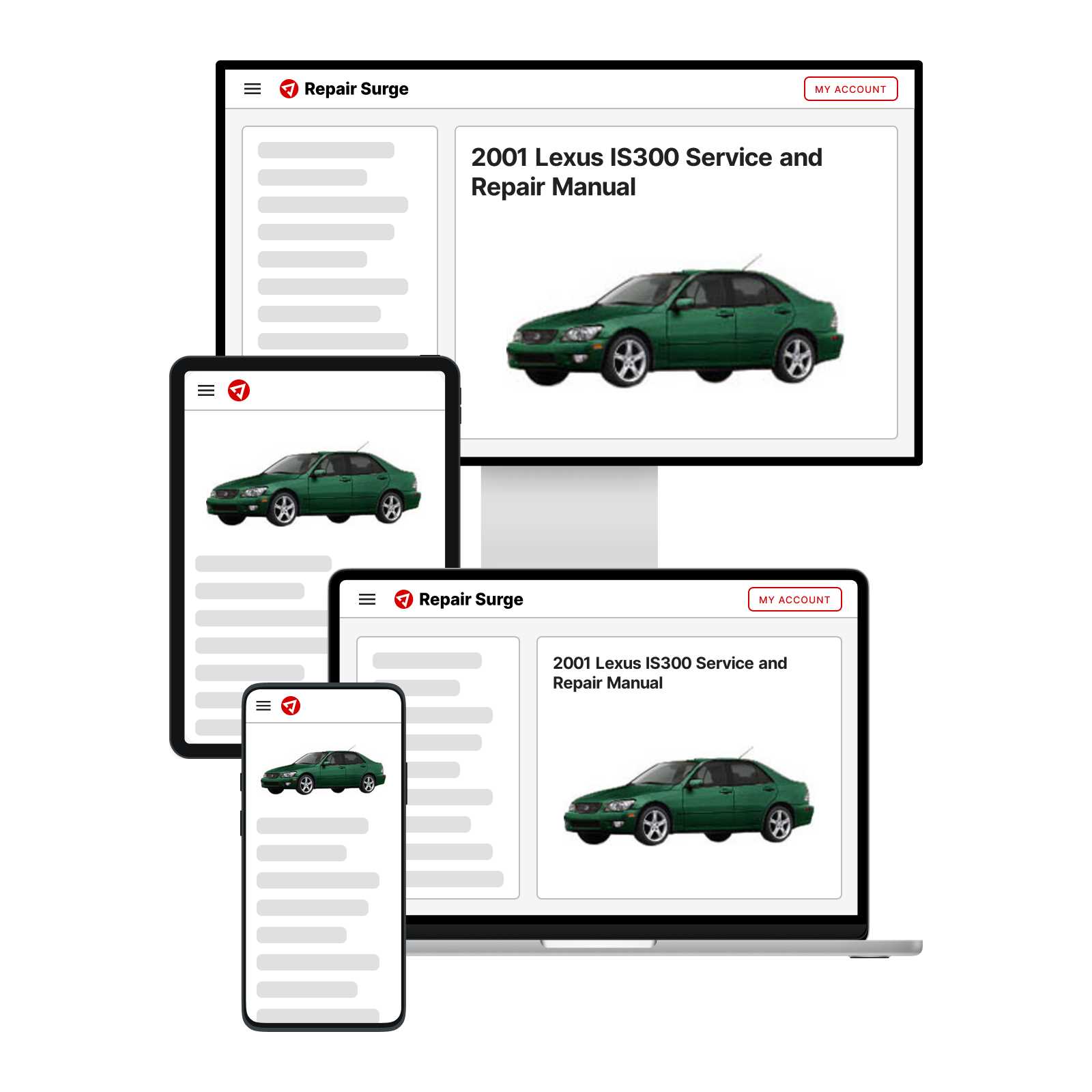
Having a well-stocked toolkit is crucial for addressing various tasks. This includes reliable socket sets, quality wrenches, screwdrivers of multiple sizes, and pliers. A hydraulic jack is also essential, as well as safety items like gloves and goggles to ensure a safe working environment.
Specialized Tools
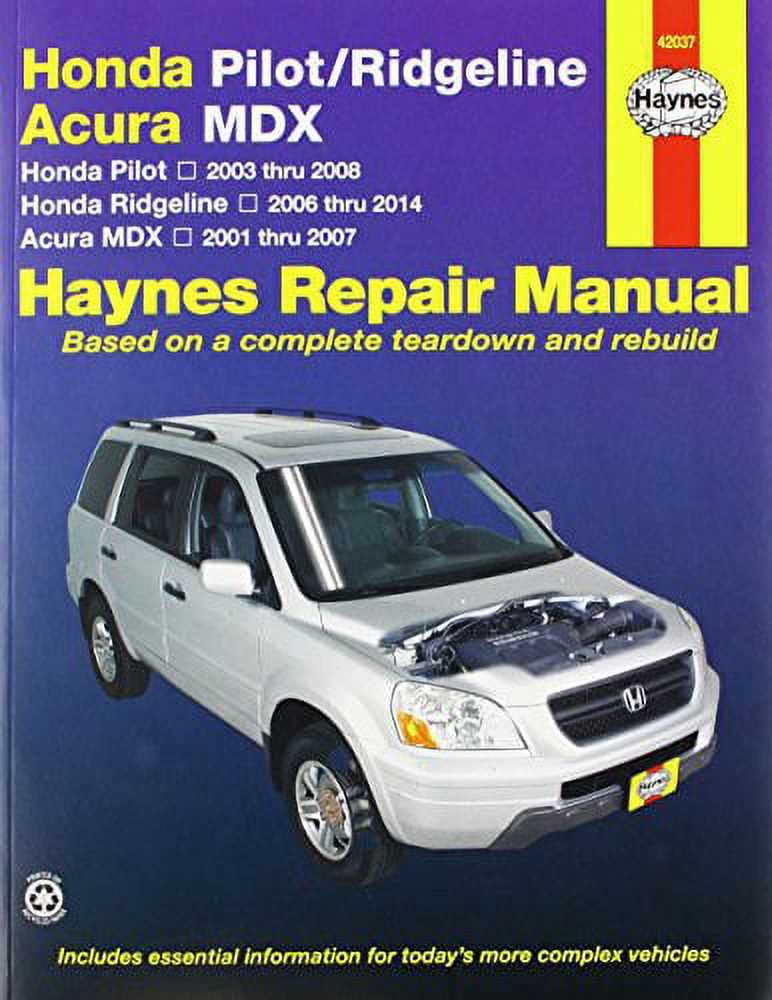
For more specific adjustments, specialized tools designed for this model can make a significant difference. Items such as an OBD-II scanner allow users to read diagnostic codes, while torque wrenches ensure that bolts are secured to the correct specifications.
| Tool Type | Purpose | ||||||||||||||||||||||||||||||||||||||||||||
|---|---|---|---|---|---|---|---|---|---|---|---|---|---|---|---|---|---|---|---|---|---|---|---|---|---|---|---|---|---|---|---|---|---|---|---|---|---|---|---|---|---|---|---|---|---|
| Socket Set | For loosening and tightening bolts and nuts | ||||||||||||||||||||||||||||||||||||||||||||
| OBD-II Scanner | Reads vehicle diagnostics and error codes | ||||||||||||||||||||||||||||||||||||||||||||
| Hydraulic Jack | Supports the vehicle for safe access underneath | ||||||||||||||||||||||||||||||||||||||||||||
| Torque Wrench | Ensures bolts are properly tightened to specifications | ||||||||||||||||||||||||||||||||||||||||||||
| Pliers and Screwdrivers | Use
Engine Troubleshooting for RX ModelDiagnosing engine issues in this model can involve understanding various potential problems and applying systematic approaches to pinpoint causes. This section provides insights into identifying and addressing common engine concerns, from irregular sounds to unusual vibrations. Recognizing early symptoms can help ensure efficient engine operation and prevent further complications. Common Issues and Their Signs
Engine troubles may present through a variety of symptoms such as rough idling, decreased performance, or inconsistent power delivery. Analyzing these signs and identifying specific issues helps narrow down possible malfunctions in components like ignition or fuel systems. Diagnostic GuideBelow is a guide that outlines common engine symptoms alongside potential causes and recommendations. This helps to facilitate a straightforward inspection process and enables a structured approach to address each issue effectively.
By conducting these inspections at regular intervals, you can help ensure the braking system functions optimally, enhancing overall driving safety and vehicle longevity. Fixing Electrical Problems in RX300
Addressing issues related to the electrical system of your vehicle can be challenging, yet essential for ensuring optimal performance. This section provides insights into identifying and resolving common electrical faults, enhancing your understanding of the components involved and the steps necessary for effective troubleshooting. One of the first steps in diagnosing electrical issues is to systematically check the various components of the electrical system. It is advisable to begin with the battery, fuses, and wiring connections, as these are often the root causes of malfunction. If any components appear damaged or corroded, they may require replacement or repair.
By following these guidelines and being proactive in addressing electrical concerns, you can maintain the functionality of your vehicle and prevent future complications. RX300 Suspension Maintenance Tips
Proper upkeep of the suspension system is crucial for ensuring a smooth and safe driving experience. Regular attention to this vital component can help extend its lifespan and enhance vehicle handling. Below are essential practices for maintaining your suspension effectively. Routine InspectionsConducting regular checks of your vehicle’s suspension is essential. Look for signs of wear, such as leaks in the shock absorbers or any unusual noises while driving. Addressing these issues promptly can prevent more significant problems down the line. Proper Tire MaintenanceMaintaining correct tire pressure and alignment significantly impacts the suspension’s performance. Ensure your tires are inflated to the manufacturer’s specifications and regularly check the alignment. This practice not only improves ride quality but also enhances fuel efficiency. Incorporating these tips into your maintenance routine will contribute to the longevity and efficiency of your vehicle’s suspension system. Cooling System Repair for Lexus RX300
The cooling system plays a vital role in maintaining the optimal temperature of the engine, preventing overheating and ensuring efficient performance. Regular maintenance and prompt attention to any issues can help extend the lifespan of the vehicle and enhance its reliability. Common problems within the cooling system may include leaks, insufficient coolant levels, and malfunctioning components such as the radiator or water pump. Diagnosing these issues early can prevent more significant damage and costly repairs down the line. To address cooling system issues effectively, it is essential to regularly check the coolant level and condition, inspect for leaks, and ensure that all components are functioning correctly. Flushing the system periodically can also remove debris and prevent corrosion, contributing to overall system efficiency. In case of a coolant leak, locate the source and replace damaged hoses or components as necessary. Additionally, monitoring the temperature gauge while driving can provide real-time feedback on the engine’s performance, alerting the driver to potential overheating. Proper care and timely intervention can significantly enhance the performance of the cooling system, promoting a smoother driving experience and reducing the likelihood of engine complications. Replacing RX300 Timing BeltChanging the timing belt is a crucial maintenance task that ensures the smooth operation of the engine. This component plays a vital role in synchronizing the movement of the engine’s internal parts, and its wear can lead to significant performance issues if not addressed promptly. Tools Required:
Before beginning, ensure that you have all the necessary tools at hand. Start by safely lifting the vehicle and removing the front wheels for better access. Drain the coolant and disconnect the battery to prevent any electrical mishaps. Steps to Follow:
Regular maintenance and timely replacement of the timing belt can significantly extend the life of the engine and improve overall vehicle reliability. Make sure to follow manufacturer recommendations for replacement intervals. Repairing Fuel System in RX300The fuel delivery mechanism plays a crucial role in the overall performance of the vehicle. Proper maintenance and timely troubleshooting of this system ensure optimal functioning and efficiency. Understanding the components involved and their interactions can aid in diagnosing issues and implementing necessary solutions. Common symptoms of fuel system problems include difficulty starting, reduced power, and poor fuel efficiency. Regular inspection of fuel lines, filters, and pumps can help identify wear or blockages. It is essential to check for leaks, which can lead to hazardous situations and diminished performance. When addressing issues, it may be necessary to clean or replace filters to improve fuel flow. Additionally, examining the fuel injectors for clogs or malfunctions can significantly enhance engine responsiveness. In some cases, a thorough cleaning of the entire system may be required to restore optimal operation. Always prioritize safety by disconnecting the battery before working on the fuel system. Use appropriate tools and protective gear, and follow standard protocols to mitigate risks associated with fuel handling. By staying proactive with maintenance, you can extend the life of the vehicle and maintain its performance. Diagnosing RX300 Steering Issues
Identifying problems related to steering can be crucial for maintaining vehicle performance and safety. Issues may manifest through unusual sounds, difficulty in maneuvering, or vibrations felt in the steering wheel. Understanding these symptoms can help pinpoint the root cause of the problem. Start by checking the steering fluid level, as low fluid can lead to ineffective steering response. If the level is adequate, listen for any strange noises when turning the wheel, which may indicate worn components or air in the system. Additionally, inspect the condition of the steering linkage and suspension parts for any signs of wear or damage. Pay attention to the alignment of the wheels, as improper alignment can cause pulling to one side and uneven tire wear. If necessary, a professional alignment check can provide insight into any underlying issues. Regular maintenance and timely diagnosis are essential to ensuring smooth steering operation. Regular Maintenance Schedule for RX300Ensuring optimal performance and longevity of your vehicle requires adhering to a systematic maintenance plan. Regular check-ups and timely service can prevent unexpected breakdowns and enhance overall reliability. This section outlines key practices and intervals that should be followed to maintain peak functionality. Key Maintenance TasksRoutine tasks include oil changes, fluid level inspections, and brake system evaluations. Changing the engine oil and filter every few months is crucial to keep the engine running smoothly. Additionally, monitoring coolant, brake fluid, and transmission fluid levels will help prevent potential issues. Tire and Brake CareRegular tire rotations and alignments are essential for even tire wear and optimal handling. It’s also important to check brake pads and discs frequently to ensure safe stopping power. Replacing worn components promptly can avoid more costly repairs in the future. |


